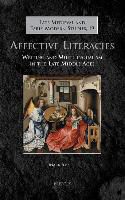Ulteriori informazioni
Adapting critical approaches and concepts from New Literacy Studies, historical sociolinguistics, and close reading, Amsler analyses how late medieval writing and literacies in Latin, English, and French 'make people up' to create literate subjects and agents (readers and writers) in multilingual manuscript cultures. Amsler argues that textual interactions make sense only when we take the 'social turn' and examine reading and writing not as individual practices toward discrete texts, but as part of wider multilingual, socio-cultural practices that could either sustain or challenge dominant ideologies and reading formations. Rather than a singular Literacy, we see socially situated literacies. In late medieval society, both traditional and new literates assumed different relationships between and among Latin, the vernaculars, and hybrid written forms. Amsler explores the intertextualities and social contests embedded in these forms, bringing new historical dimensions to literacy studies. The individual chapters in this volume examine literacies as cultural practice in elite and popular texts and also in schooling. They consider texts by Chaucer, Christine de Pizan, Dante, Margery Kempe, devotional writers, Erasmus, and the Jewish convert Hermann of Scheda alongside grammatical writing, mythography, charms, drama, and educational texts. This volume sets individual Latin and vernacular works within historical and linguistic contexts, which illustrates the diversity of late medieval multilingual writing, performance, and embodied reading.

